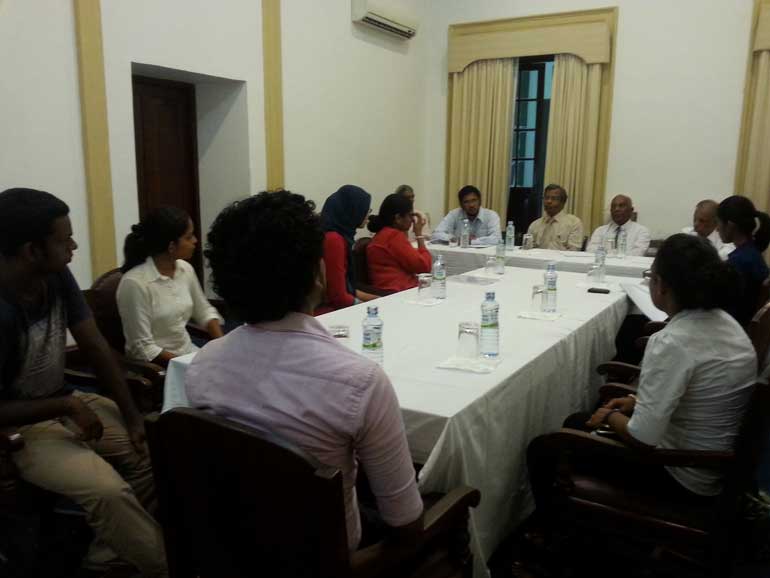Wednesday Feb 25, 2026
Wednesday Feb 25, 2026
Monday, 11 April 2016 00:00 - - {{hitsCtrl.values.hits}}
 Undergraduates of the Faculty of Law, University of Colombo presented their proposals on Constitutional Reforms on 30 March. Among the proposals was the draft Bill of Rights designed by the final year undergraduates following the Human Rights course. The proposals were received by the Members of the Public Representations Committee headed by Mr. Lal Wijenayake. The Committee members and the undergraduates engaged in detailed discussions on the integral aspects a Constitution including supremacy of the Constitution, judicial review of legislation, language of administration and human rights. The discussion also focused on the need for recognition of minority rights and women’s rights.
Undergraduates of the Faculty of Law, University of Colombo presented their proposals on Constitutional Reforms on 30 March. Among the proposals was the draft Bill of Rights designed by the final year undergraduates following the Human Rights course. The proposals were received by the Members of the Public Representations Committee headed by Mr. Lal Wijenayake. The Committee members and the undergraduates engaged in detailed discussions on the integral aspects a Constitution including supremacy of the Constitution, judicial review of legislation, language of administration and human rights. The discussion also focused on the need for recognition of minority rights and women’s rights.
The draft fundamental rights chapter presented to the Committee was drafted with the vision of empowering the people to transform the aspirations of a nation into a lived reality.The chapter expands the scope of the rights guaranteed under the 1978 Constitution and the Draft Constitutional Bill of 2000. A main theme which runs throughout the draft fundamental rights chapter is guaranteeing maximum protection for human life, dignity and liberty.The significant provisions in the draft chapter are as follows,
Protection of human life and dignity
The proposal includes a provision on right to life and the abolition of death penalty. It is also proposed that the right of humane treatment be included as a positive obligation of the State replacing the provision on freedom from torture.
Protection of human liberty
The proposal extends on the safeguards provided for the prisoners. Significant among the provisions is the introduction of the right of an arrested individual to remain silent.The proposal acknowledges the right as non-derogable.
Equality
The equality provision is further strengthened with additions made to the prohibited grounds of discrimination, such as belief, gender, sex, sexual orientation, age, health status, economic and social status, mode of acquisition of citizenship, marital status and maternity. Equal status of women is given express recognition in the equality provision as well.
Speech and expression
The chapter expressly provides for the right of press and publication, the right to petition and the right to dissent as inclusive in the freedom of speech and expression. The provision however, further states that the freedom of speech does not extend to the exploitation of the freedom by way of instigation of racial violence.
Economic, Social and Cultural Rights
The chapter recognises Economic, Social and Cultural Rights as enforceable rights. This is advocated on the basis that Economic, Social and Cultural Rights are indivisible and interrelated to the Civil and Political Rights in a manner which makes effective realisation of one set of rights dependent upon realisation of the other set of rights. The Economic, Social and Cultural rights recognised includes the right to education, right relating to environment and clean water, rights of the consumers, rights to safe conditions of work, right to ownership of property and the special rights of children.
Position on inconsistent laws and international obligations
The draft chapter also upholds the supremacy of the Constitution by invalidating laws that are inconsistent with the provisions of the chapter.
This needs to be contrasted with the provision in the present Constitution that invalidates the fundamental rights in instances of inconsistency by any written or unwritten law.
The proposal, while acknowledging the need for the reform of personal laws,takes due notice oftheir value to the communities who are governed by them.
Thus it provides for a commission to reform the discriminatory personal laws to bring them in line with the fundamental rights chapter. Furthermore, the need to interpret the fundamental rights in light of Sri Lanka’s international obligations relating to human rights is emphasised.
The undergraduates believe that the opportunity for a progressive future by way of new Constitution should be made use of, by the State and the people alike, to ensure that the rights of every individual is protected and respected. A step further, the fundamental rights guaranteed by way of a Constitution also needs to empower the individuals to protect themselves against abuse of power.